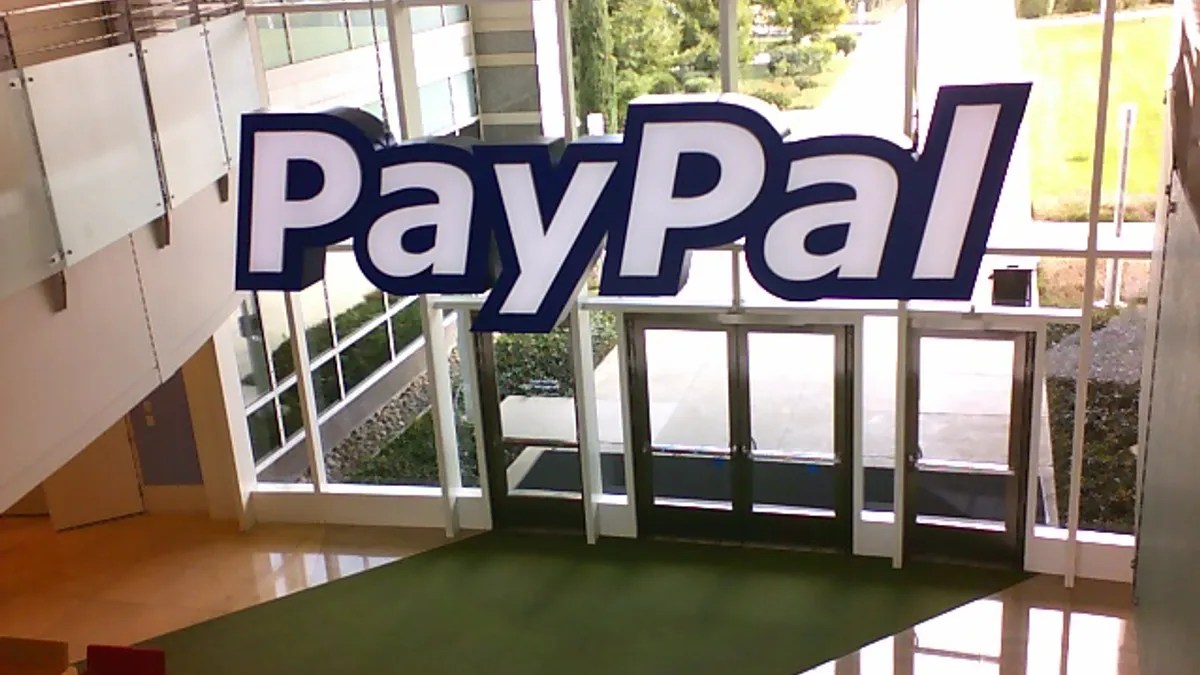Dive Brief:
- The Student Borrower Protection Center (SBPC) and three other advocacy groups sent a joint letter last week to the Consumer Financial Protection Bureau (CFPB) and the Office of the Comptroller of the Currency (OCC), urging regulators to investigate PayPal and Synchrony after the SBPC found more than 150 career-training schools — most unaccredited and many largely unsupervised — that let students pay tuition using PayPal Credit. Synchrony is the product's exclusive issuer.
- At issue is the 25.49% annual percentage rate tied to PayPal Credit — quadruple the rate of even the most expensive federal student loans, the groups said. Additionally, PayPal Credit borrowers who fall behind rack up late fees of up to $39 per missed payment. Federal student loans, by comparison, have no such fees.
- The groups also took exception with what they called “misleading marketing” surrounding a six-month deferred interest offering available through PayPal Credit. Borrowers are not charged interest throughout their first six months. However, if they don’t pay the full loan off by then, the 25.49% APR is retroactively charged from the loan’s origination date and added to the balance. That fine print may not be obvious to some borrowers, the groups warned.
Dive Insight:
The advocacy groups wrote a separate letter to PayPal last week, calling on it to stop offering PayPal Credit as a payment option for the schools — some of which promise borrowers bright futures as home inspectors, makeup artists, flight attendants or bodyguards. Other institutions offer courses in essential oils, swordsmanship, hypnosis or veganism.
PayPal mainly promotes the credit account for e-commerce, but also makes it available to schools offering short-term certificate programs that are generally ineligible to offer lower-cost federal student loans, the advocacy groups said, adding the payment option “can leave borrowers in significant financial distress with few protections.”
PayPal said Friday it had begun reviewing the list of schools included in the letter and is “taking actions if our products are misrepresented or characterized incorrectly,” according to The New York Times.
PayPal spokesman Joseph Gallo told The Washington Post the company is taking the claims in the letter “very seriously.” PayPal “adheres to all state and federal regulations to ensure clear, easy to understand information about credit products,” Gallo said, adding PayPal does not directly market to for-profit schools and has “no direct relationship” to the career training schools noted in the letter.
“If an organization is found to be using inaccurate or misleading messaging or characterization about PayPal Credit products without our prior knowledge or consent, we will quickly move to terminate the use of our services,” Gallo told the Post in a statement.
A spokeswoman for PayPal Credit’s issuer, Synchrony, declined to comment Monday to American Banker.
The Student Borrower Protection Center made headlines in February for publishing case studies that highlighted potential racial disparities in the terms of student loans issued by Wells Fargo and Upstart. The advocacy group’s letter to the CFPB and OCC follows a report it published last month on “shadow student debt” — its term for high-interest financing offered to students at for-profit schools under terms that may not meet the legal definition of a private student loan.
As an example, the SBPC said, a student who finances his or her $6,800 tuition from Home Inspection Institute using PayPal Credit would pay $13,634 over the life of the loan — owing $227 each month in student loans while working in a field where salaries start at $24,000.
“The use of PayPal Credit allows many of these schools to secure students’ up-front payments, which are critical to the institutions’ survival,” the advocacy groups wrote to PayPal. “But it remains unclear what criteria — if any — your company uses to determine what schools or programs may offer PayPal Credit as a method for student borrowing.”
Seth Frotman, executive director of the SBPC, called the product “predatory.”
“With millions of Americans out of work … they may turn to people promising a higher-paying job or a new career, and often it’s fraudulent,” Frotman told the Post. “PayPal seems all too willing to profit off their plight with exceedingly high-cost products for the most vulnerable borrowers.”
Another issue the advocacy groups have with PayPal Credit is its “aggressive” debt collection policy.
“If a borrower defaults, PayPal Credit charges the borrower for any expenses associated with the collection of the borrower’s debt. If a borrower dies, PayPal reserves the right to ‘request payment of the full amount due right away’ from the estate of the deceased borrower,” the advocacy groups wrote to the CFPB and OCC. “And if a borrower should object to PayPal Credit’s conduct before default, they will be required to seek redress in arbitration instead of being given their day in court.”
An OCC representative acknowledged to the Times that the regulator received the letter but said “we do not comment on specific bank matters and products.” The CFPB declined to comment.
PayPal Credit has faced CFPB action before. The bureau in 2015 alleged that PayPal Credit “deceptively advertised promotional benefits that it failed to honor, signed consumers up for credit without their permission, made them use PayPal Credit instead of their preferred payment method, and then mishandled billing disputes.” PayPal Credit refunded consumers $15 million and paid a $10 million fine.














